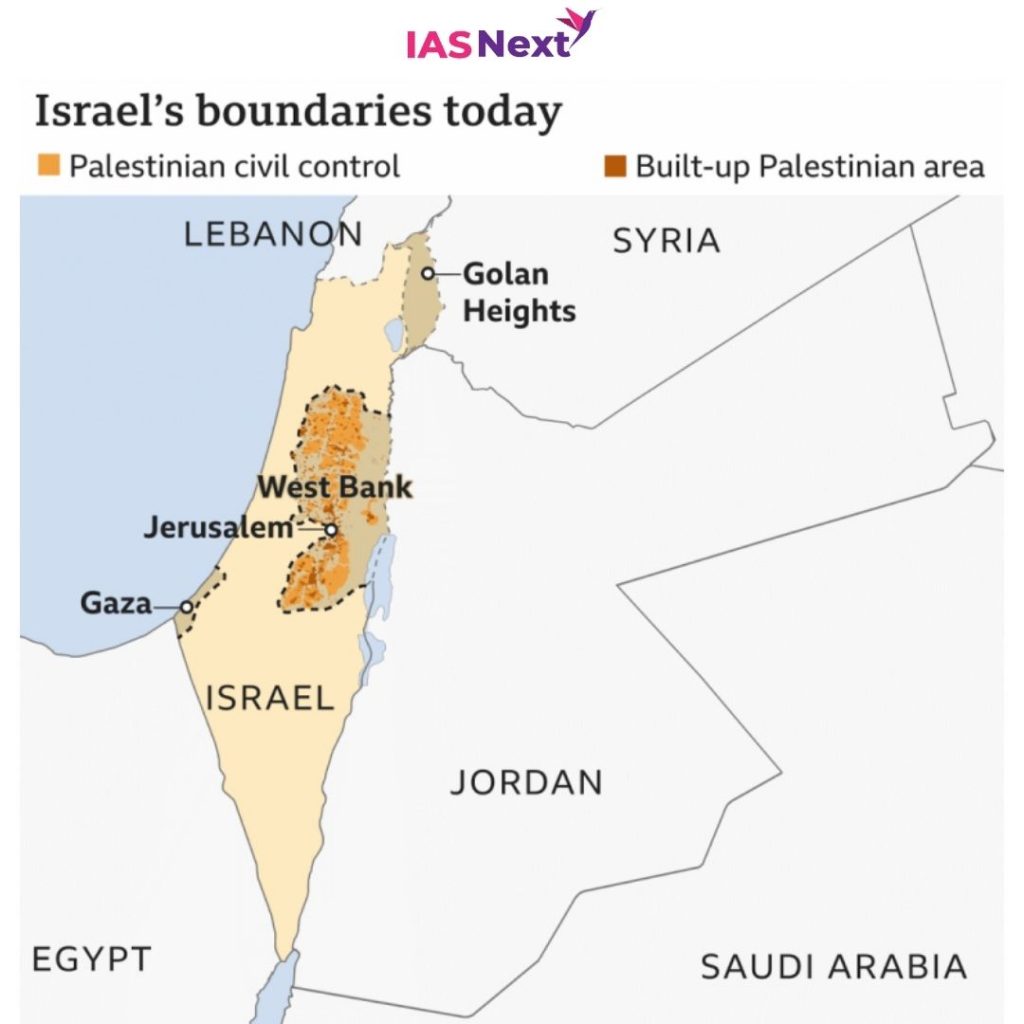CURRENT AFFAIRS
Get the most updated and recent current affair content on Padhaikaro.com
Israel- Palestine issue in West Bank
- IAS NEXT, Lucknow
- 27, Oct 2021

Israel government has approved more than 1,300 new settlement housing units in the occupied West Bank (A territory the Palestinians seek as part of a future state).
- The move appears to run contrary to the new government’s pledge to put ideological considerations aside and reduce tensions with the Palestinians.
Israel- Palestine conflict– Historical Background:
- The conflict has been ongoing for more than 100 years between Jews and Arabs over a piece of land between Jordan River and the Mediterranean Sea.
- It was between 1882 to 1948, when the Jews from around the world gathered in Palestine. This movement came to be known as
- Then in 1917, Ottoman Empirefell after World War 1 and the UK got control over Palestine.
- The land was inhabited by a Jewish minority and Arab majority.
- The Balfour Declaration was issued after Britain gained control with the aim of establishing a home for the Jews in Palestine. However during that period the Arabs were in majority in Palestine.
- Jews favored the idea while the Palestinians rejected it. Almost 6 million Jews lost their lives in the Holocaust which also ignited further demand of a separate Jewish state.
- Jews claimed Palestine to be their natural home while the Arabs too did not leave the land and claimed it.
- The international community supported the Jews.
- In 1947, the UN voted for Palestine to be split into separate Jewish and Arab states, with Jerusalem becoming an international city.
- That plan was accepted by Jewish leaders but rejected by the Arab side and never implemented.

The creation of Israel and the ‘Catastrophe’:
- It was in the year 1948 that Britain lifted its control over the area and Jews declared the creation of Israel. Although Palestinians objected, Jews did not back out which led to an armed conflict.
- The neighboring Arabs also invaded and were thrashed by the Israeli troops. This made thousands of Palestinians flee their homes. This was called Al-Nakba, or the “Catastrophe”.
- Israel had gained maximum control over the territory after this came to an end.
- Jordanthen went on a war with Israel and seized control over a part of the land which was called the West Bank, and Egypt occupied Gaza.
- Jerusalem was divided between Israel in the West and Jordan in the East.However, no formal peace agreement was signed, each side continued to blame each other for the tension and the region saw more wars.
- Israeli forces captured East Jerusalem and the West Bank, various areas of Syrian Golan Heights, Gaza and the Egyptian Sinai Peninsula in the year 1967.
Present scenario:
- Israel still occupies the West Bank, and although it pulled out of Gaza the UN still regards that piece of land as part of occupied territory.
- Israel claims the whole of Jerusalem as its capital, while the Palestinians claim East Jerusalem as the capital of a future Palestinian state.
- Tensions escalated in recent month over Israel’s actions concerning Al-Asqa mosque in East Jerusalem.
Where is the West Bank?
It is a landlocked territory near the Mediterranean coast of Western Asia, bordered by Jordan to the east and by the Green Line separating it and Israel on the south, west and north. The West Bank also contains a significant section of the western Dead Sea shore.
What are the disputed settlements here? Who lives there?
- The West Bank was captured by Jordan after the 1948 Arab-Israeli War.
- Israel snatched it back during the Six Day War of 1967, and has occupied it ever since. During this war, the country defeated the combined forces of Egypt, Syria, and Jordan.
- It has built some 130 formal settlements in the West Bank, and a similar number of smaller, informal settlements have mushroomed over the last 20-25 years.
- Over 4 lakh Israeli settlers — many of them religious Zionists who claim a Biblical birthright over this land — now live here, along with some 26 lakh Palestinians.
- The territory is still a point of contention due to a large number of Palestinians who live there and hope to see the land become a part of their future state.
- When Israel took control of the land in 1967 it allowed Jewish people to move in, but Palestinians consider the West Bank illegally occupied Palestinian land.
Are these settlements illegal?
The United Nations General Assembly, the UN Security Council, and the International Court of Justice have said that the West Bank settlements are violative of the Fourth Geneva Convention.
- Under the Fourth Geneva Convention (1949), an occupying power “shall not deport or transfer parts of its own civilian population into the territory it occupies”.
Under the Rome Statute that set up the International Criminal Court in 1998, such transfers constitute war crimes, as does the “extensive destruction and appropriation of property, not justified by military necessity and carried out unlawfully and wantonly”.